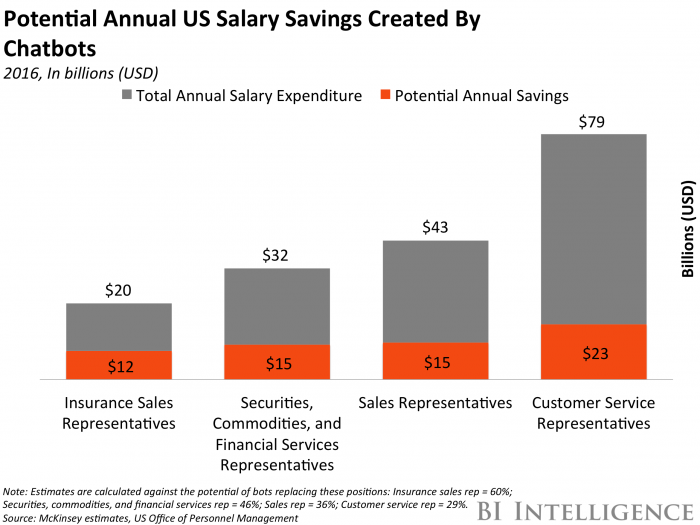
12 Jan Hi, I Am a Bot, and I will Take Away Your Job in the Financial Sector
Three Ways the Financial Sector will be Affected by Artificial Intelligence (AI) in the Next Few Years
Every time I have to call my bank for customer support and hang on the line for 15 minutes, I feel like I am wasting my time. In this case, I value my time more than personal assistance. We see more and more self-serviced and completely digitalized banks where you have little to no interaction with people. I believe that this will change even further thanks to chatbots and AI.
1. Customer support will be done by a chatbot.
Chatbots do a much better job at replying to frequently asked questions and dealing with support cases such as ordering a new bank card, canceling your card, asking for a bank statement, etc. than people do. What you want from your bank is the ability to solve problems quickly and come up with a solution to your problem ASAP
“Hi, to my Austrian Bank, where every time I login into my personal banking I see a new “Account Manager” who wants to “connect” with me, and that sends me once a year SMS with birthday wishes.”
Few banks have already pioneered and moved in the direction to provide customer support over messaging apps. For example, B1NK Digital Bank from Kazakhstan launched a bot for Telegram where you can send money to friends, manage cards, and keep up-to-date with their promotions. Another example Singaporean bank DBS’s bot.
Another thing that chatbots will change is how you get your insurance policy. Chatbots will be able to analyze large amounts of data such as social media profiles, information available about your city such as the number of car accidents and pollution levels in seconds. Based on that information, you will get a better deal straight away on your insurance.
AI will also affect the internal operations of the insurance companies. Recently, a Japanese insurance company announced that it will lay off 30 employees and replace them with an AI system powered by IBM, Watson. The new system will automatically calculate payouts. According to IBM, Watson can “analyze and interpret all of your data, including unstructured text, images, audio and video.”
3. Chatbots will help you to manage money.
Another big thing that bots are going to change in the financial sector is delivering a much better analysis and giving out much better predictions to help you manage and save money.
Recently, Bank of America announced the launch of its chatbot, Erica, which will be within their banking app. The chatbot will be available in late 2017 and will analyze your banking history and give you much better predictions on how to handle your finances.
“For example, it may recommend that a customer make higher monthly payments toward an outstanding bill to reduce interest charges over time; or if a customer asks to learn their bank balance, it will be able to warn them if they’re close to going into overdraft without being prompted” — Business Insider.
There are a few startup companies that are also developing services in this direction, such as Digit, Claritymoney, and Abe.
Jobs.
The following graph was recently posted in Business Insider demonstrating potential US salary “savings” created by chatbots. As you can see, the potential to cut employment lies across a broad range of jobs in the financial sector. In my opinion, the first to be affected will be call/support centers and sales reps trying to sell financial products.

Key Conclusions
All in all, there are a lot of change coming to the financial sector with the rise of chatbots and AI, which will affect the job landscape in the sector. This development creates an opportunity for financial institutions that can adapt fast and for smaller bot companies to create robust and secure chatbot solutions, mainly because consumers rely more and more on self-service and want to limit human interaction to the benefit of efficiency.


No Comments